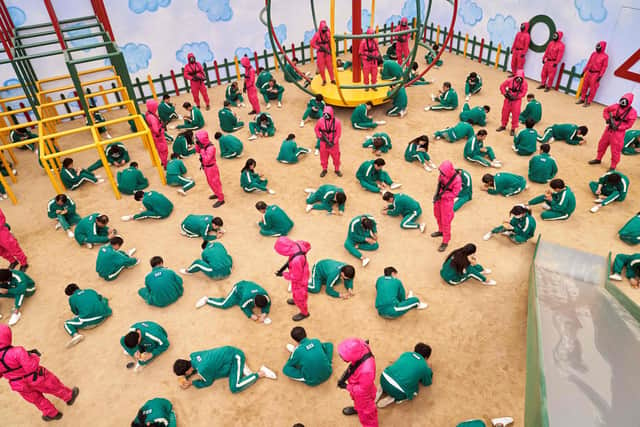Netflix’s Squid Game: Bristol University psychologist’s advice to parents over hit series
and live on Freeview channel 276
A Bristol University psychologist has issued a warning to parents following the release of Netflix’s Squid Game.
The South Korean show is rated appropriate for viewers aged 15 and older, despite depicting scenes of people being shot in the head, dropped from great heights and placed in coffins while still alive.
Advertisement
Hide AdAdvertisement
Hide AdIt sees characters compete in challenges based on playground games to win 45.6 billion Won (£28.2 million), but with fatal consequences if they lose.
The launch of the series is Netflix’s most successful to date, with 111 million viewers in the first 28 days.
However, concerns have been raised about how the brutal content of Squid Game affects the emotional and social development of young viewers.
Nilufar Ahmed, a psychologist and lecturer at Bristol University, spoke to BristolWorld about the potential impact of the series on children and what parents should do if they are concerned.
Advertisement
Hide AdAdvertisement
Hide AdShe said: “There is a lot of research that shows that children who watch violent programmes sleep less well than children who aren’t exposed to kind of material.
“And of course, sleeps affects everything - it can affect their performance at school as well as the way they interact with their peers.
“It doesn’t mean that everyone who watches the show will necessarily go out and be violent, but there is a correlation between this type of material and children displaying aggressive behaviour as well.
“It’s not just children who might be affected. People who watch a lot of horror tend to be desensitized - you might not make that link between watching it and the poor sleep you get afterwards.
Advertisement
Hide AdAdvertisement
Hide Ad“I think most people who have watched Squid Game find the level of violence it depicts really intense.
“It’s not like traditional horror in that there’s no preamble - it hits you with that bruality immediately.
“All the while, it’s tapping into our memories because it features games we’ve all played hundreds of times as kids in the school yard such as the tug of war - only the consequence for losing is death.
“It’s totally fine of course for children to play the traditional versions of these games but parents and staff should definitely try to gauge a child’s reaction to losing if they’ve watched the show.”


Advertisement
Hide AdAdvertisement
Hide AdSquid Game is bound to affect individuals in different ways and ‘open discussions’ are key especially when it comes to children, said Nilufar.
She does not think the show should be banned, but feels Netflix could make more of the tiny trigger warning that appears for a short time during the show’s opening credits.
“It’s very difficult to totally control what our children are watching,” Nilufar added.
“The fact is if children are desperate to watch something these says, they’ll find a way - it could be that they find the content they’re looking for on another site or manage to access it through a friend.
Advertisement
Hide AdAdvertisement
Hide Ad“Squid Game is everywhere at the moment so have a conversation with your child about it if they bring it up. Ask them what they’ve heard about the programme and what interests them about it.
“We’re all drawn to gore and violence and children are no different.
“Try to make it clear that the violence depicted in the show is fictionalised and not real.
“I think what’s important to note is that inbetween the violence and horror, the show raises themes surrounding friendship, relationships and betrayal.

Advertisement
Hide AdAdvertisement
Hide Ad“These potentially moderate the brutality of the story and are an opportunity for a ‘teachable’ moment.
“In this way we can teach children and people in general to behave empathatically and instil a sense of individual and social responsibility.”
Comment Guidelines
National World encourages reader discussion on our stories. User feedback, insights and back-and-forth exchanges add a rich layer of context to reporting. Please review our Community Guidelines before commenting.